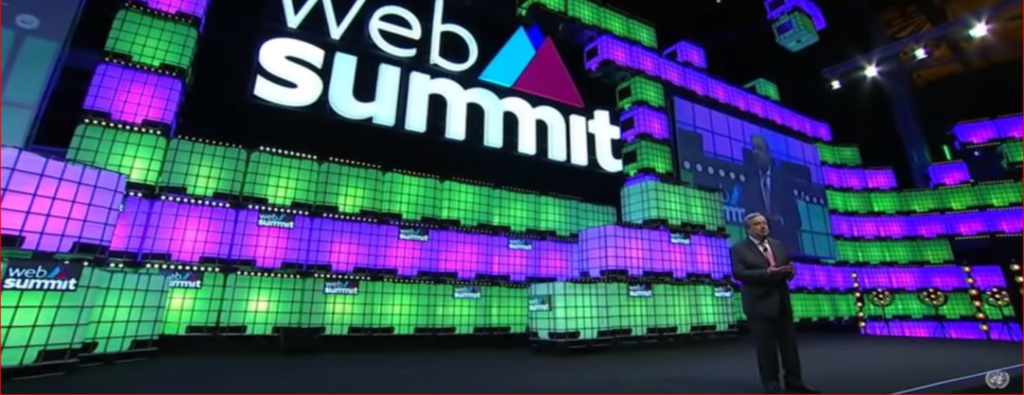“I want a platform where governments, academia, scientists, companies and civil society can come together and find ways to discuss and to agree on protocols, on codes of conduct and other mechanisms that allow for cyberspace, for digital technologies, for the web, for artificial intelligence, to be essentially a force for good.”
Lisbon is a marvelous city. It’s airy, and you can smell the sun. From its heights, one can see the large Tagus River all the way to the bridge that connects it to the shipyards district, Almada, and its great fish restaurants. Following the majolicas one gets to the old town and then to grand Comércio Square right on the river bank.
Beginning this year, Lisbon will host Web Summit, a for profit event that somehow emerged as an international must-do event for technology leaders.
In Dublin it was a parade of startup and corporation leaders telling their stories, the former, and repositioning the brands towards more innovation and more social responsibility the latter. Technologies presented are all different, and very interesting, but the stories tend to quite liken each other. The speeches of the public personalities, for their part, often touch upon issues already known — with the proverbial exception that seems to prove the rule, meaning exceptions.
“The most fascinating thing about cutting-edge technologies is the speed — they move at warp speed. Ninety per cent of the data that exists today was created in the last two years. To store one megabyte of data in the ’60s, the cost was something like $1 million, now it’s less than two cents. Blockchain or gene testing are now common technologies. To the “Internet of things”, which is moving so exponentially, we are now adding the web connecting medical implants. This is now moving from experimentation to the mainstream. Artificial intelligence is everywhere.”
These technologies, went on the man over-60 with an accent from, are helping “us cure diseases, fight hunger. They boost economic growth and development all over the world. At the same time, the use of these technologies allows us to be much more effective in addressing the problems of today’s world.”
To tackle “a globalization that has some imbalances and a lot of inequality”, “we have the Goals of UN Agenda 2030 — from education to health, from rescuing the oceans to climate action — which would be absolutely impossible to achieve without ‘turbocharging’ the world with the fantastic speed of cutting-edge technologies.”
There are, however, also challenges and risks, he continued. First, the social impact of the Fourth Industrial Revolution: in the next few decades: an enormous amount of jobs will be created and as many old jobs will be destroyed. It’s difficult to know which number will be bigger but those jobs will be very different.” So we will face huge unemployment, he added, and disruption in societies with an impact on their social cohesion.
We will face, therefore, “a need for a massive investment in education but a different sort of education. What matters now is not to learn things but to learn how to learn things.” Many will acquire the skills to allow them to have new professions, some will be left behind. “We will need a new generation of safety nets to allow for people to survive and to have a new meaning for their own lives.” We are not doing enough, he said, not fast enough.
His second concern was that in spite of the Internet linking now half of the world’s population, and having given voice to many people marginalized by history, it was now also conveying hate speech, violating the privacy of people, and, in some situations, allowing governments and other institutions to oppress, censor and control.
“Now, it is clear for me that it was not the web that has created populism, tribalism, and polarization of societies. These have very deep root causes. You can’t blame the web for that. But it is true that the web is amplifying those problems and we need to mobilize governments, civil society, academia, and scientists in order to be able to avoid the digital manipulation of elections, for instance, and to create filters able to block hate speech from moving and being a factor of the instability of societies.”
His third concern was human agency and control, an issue where artificial intelligence is at the center, as many things that were done by people are now done by machines. “Let’s be clear, in many circumstances, they are better done by machines”.
What is important, he remarked, is not to forget that “the weaponization of artificial intelligence” is a serious danger that could create enormous difficulties in avoiding the escalation in conflicts and in guaranteeing that international humanitarian law and human rights law are respected on the battlefields. “Machines that have the power and the discretion to take human lives are politically unacceptable, are morally repugnant, and should be banned by international law.”
To address these issues, “traditional forms of regulation necessarily do not apply always. In the majority of circumstances, technology moves so fast that the time to gather people for preparation of a convention, to discuss it, to approve it, to ratify and to implement it — by the time it comes, everything is already very different.”
“And so, what we need is to create platforms. I want the United Nations to be a platform where governments, academia, scientists, companies and civil society can come together and can find ways to discuss and to agree on protocols, on codes of conduct and other mechanisms that allow for cyberspace, for digital technologies, for the web, for artificial intelligence, to be essentially a force for good. ”
Yes, you guessed right, that was UN Secretary-General António Guterres. Yes, he is a trained engineer, but he spent most of his life witnessing the suffering of the most vulnerable people on earth. Nonetheless, he summed up the issues with technology today, the good and the bad, like few other public leaders are able to.
Thanks, Web Summit. It’s good to know that there are such knowledgeable leaders.
PS — The UN itself is using the above mentioned technologies. OCHA uses them for humanitarian emergency relief, UNICEF maps the connections between schools in remote areas, WFP addresses through blockchain the problems of tracking payments, and the Office of the UN High Commissioner for Refugees (UNHCR) is creating the conditions to use biometrics to better support and protect refugees.
The second exception in a next post.



